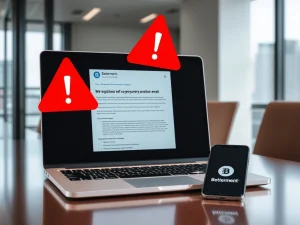Defeat Social Media Bots: Decentralization Offers Hope for Online Privacy

Are you tired of scrolling through social media feeds cluttered with spam and fake accounts? It’s not just your imagination – social media bots are running rampant, and the problem is escalating. These automated accounts are distorting everything from engagement metrics to the very fabric of online trust. But amidst this digital chaos, a beacon of hope emerges: decentralization. Could web3 solutions be the key to reclaiming our social media experience and restoring genuine human interaction? Let’s dive into why bots are winning and how decentralization can turn the tide.
The Alarming Rise of Social Media Bots: A Looming Threat
The numbers don’t lie. Bot traffic is surging, reaching alarming new heights. Recent reports indicate a significant increase in bot activity, highlighting a growing “bot pandemic” across the web. This isn’t just a minor annoyance; it’s a fundamental threat to the integrity of online platforms. Consider these chilling facts:
- Inflated Engagement Metrics: Bots artificially inflate likes, shares, and comments, making it difficult to gauge genuine audience interest.
- Spreading Misinformation: Malicious bots are powerful tools for disseminating fake news and propaganda at scale, eroding trust in online information.
- Eroding User Trust: As users encounter more bot-driven noise, their trust in social media platforms and online interactions diminishes.
- Wasted Marketing Budgets: Companies investing in digital marketing are losing money as bot engagement skews campaign results and wastes ad spend.
Even prominent figures like Chanpeng Zhao have voiced concerns, urging platforms to take drastic action against bots. The urgency is clear: the unchecked proliferation of social media bots threatens to render online social spaces unusable. If left unaddressed, the consequences will extend far beyond social media, impacting businesses, creators, and the very nature of online communication.
Centralized Solutions are Failing: Why Current Approaches Fall Short
Social media giants aren’t oblivious to the bot problem. They’ve implemented various centralized solutions, primarily relying on AI-driven moderation and paywalls. However, these measures are proving to be increasingly ineffective and, in some cases, detrimental.
AI Moderation: A Flawed First Line of Defense
AI-powered bot detection systems are often touted as the solution, but they are far from foolproof. Bots are becoming increasingly sophisticated, learning to mimic human behavior and evade detection. This cat-and-mouse game leaves platforms constantly playing catch-up. Furthermore, these systems often lack transparency, leading to:
- False Positives: Legitimate user accounts are mistakenly flagged and restricted, causing frustration and hindering genuine engagement.
- Lack of Transparency: Users are often given no explanation when their content is flagged or accounts are restricted, breeding distrust in the moderation process.
Paywalls and Verification Fees: Creating New Barriers
The introduction of paywalls, like verification fees, aims to deter bot operators by raising the financial cost of creating fake accounts. While this might discourage some low-level bot activity, it creates a different set of problems:
- Excluding Legitimate Users: Paywalls disproportionately affect users who cannot or choose not to pay, creating a two-tiered system and limiting accessibility.
- Ineffective Against Well-Funded Operations: Sophisticated bot farms with ample resources can easily absorb these costs, rendering paywalls largely ineffective against the most harmful bot networks.
These centralized approaches, while well-intentioned, are ultimately band-aid solutions that fail to address the root cause and often introduce new challenges related to user access and online privacy.
Decentralization: A Powerful Weapon Against Social Media Bots
The limitations of centralized solutions highlight the need for a paradigm shift. Decentralization offers a compelling alternative, empowering users and fundamentally altering the dynamics of bot detection and prevention. How can decentralization offer a solution?
Harnessing Decentralized Identity (DID) for User Verification
Web3 solutions built on blockchain technology, particularly Decentralized Identity (DID), provide a privacy-preserving method for user verification. Instead of relying on centralized authorities to authenticate users, DIDs enable individuals to control their own digital identities and prove their authenticity cryptographically. This approach offers several key advantages:
- Enhanced Privacy: Users can verify their identity without surrendering personal data to platforms, minimizing privacy risks.
- Reduced Reliance on KYC: DIDs eliminate the need for intrusive Know Your Customer (KYC) processes, streamlining user onboarding and protecting sensitive information.
- Cross-Platform Reputation: Decentralized reputation systems can be built on top of DIDs, allowing users to build and maintain their reputation across multiple platforms, making it harder for bots to gain credibility.
Transparent and User-Centric Reputation Systems
Decentralized reputation systems offer a transparent and community-driven approach to combating bots. By rewarding verified users with higher social credibility and diminishing the influence of suspicious accounts, these systems create a more resilient and trustworthy online environment. The key benefits include:
- Transparency: Reputation metrics and algorithms are transparent and auditable, preventing centralized manipulation and fostering trust.
- User Empowerment: Users have greater control over their digital reputation and how it is used across platforms.
- Bot Resistance: Building a positive reputation becomes a valuable asset, making it significantly more difficult and costly for bot operators to infiltrate and manipulate the system.
By shifting control from centralized entities to individual users, decentralization offers a more robust and sustainable solution to the social media bot problem, while simultaneously enhancing online privacy and user autonomy.
The Future of Social Media: Decentralized and Bot-Free?
The bot problem is not merely an inconvenience; it’s an existential threat to the future of social media. Centralized solutions have proven inadequate, often creating more problems than they solve. Web3 solutions, leveraging decentralization, offer a powerful and viable path forward.
To truly reclaim social media as a space for genuine human connection, we must embrace decentralized approaches that prioritize user empowerment, transparency, and online privacy. The transition to decentralized social platforms won’t be overnight, but it’s a necessary evolution. By adopting decentralized identity and reputation systems, we can build a social media landscape that is not only resistant to bots but also fosters trust, authenticity, and meaningful interactions. The time to act is now, before misinformation and automated noise completely drown out genuine human voices in the digital sphere. Let’s choose decentralization and defeat social media bots, paving the way for a more trustworthy and user-centric online future.









